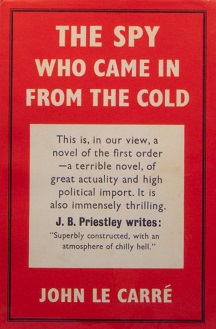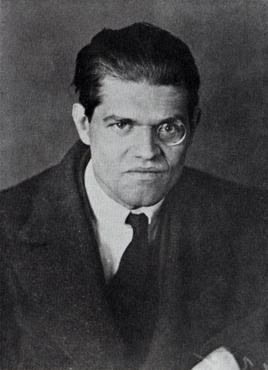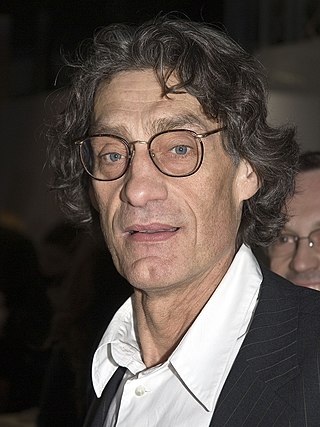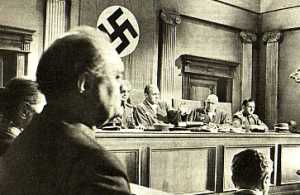
The Spy Who Came in from the Cold is a 1963 Cold War spy novel by the British author John le Carré. It depicts Alec Leamas, a British agent, being sent to East Germany as a faux defector to sow disinformation about a powerful East German intelligence officer. It serves as a sequel to le Carré's previous novels Call for the Dead and A Murder of Quality, which also featured the fictitious British intelligence organization, "The Circus", and its agents George Smiley and Peter Guillam.

Pankow is the second largest area of Berlin by population. In Berlin's 2001 administrative reform, it was merged with the former boroughs of Prenzlauer Berg and Weißensee; the resulting borough retained the name Pankow. Pankow was sometimes claimed by the Western Allies to be the capital of the German Democratic Republic, while the German Democratic Republic itself considered East Berlin to be its capital.

Raoul Hausmann was an Austrian artist and writer. One of the key figures in Berlin Dada, his experimental photographic collages, sound poetry, and institutional critiques would have a profound influence on the European Avant-Garde in the aftermath of World War I.

Alles auf Zucker! is a German comedy film, released internationally in 2004. It can be seen as part of the "Ossi-Wessi" confrontation within Germany. Directed by Dani Levy, the cast includes Henry Hübchen, Hannelore Elsner, Udo Samel, Gołda Tencer and Steffen Groth.

Mephisto – Novel of a Career is the sixth novel by German author Klaus Mann.

Sebastian Koch is a German television and film actor. He is known for roles in the 2007 Academy Award-winning film The Lives of Others, in Steven Spielberg's Bridge of Spies, and as Otto Düring in the fifth season of the Showtime series Homeland.

Winfried Glatzeder is a German television actor and playwright. He began his acting career in East Germany in the 1960s. In the early 1970s, he made his breakthrough by starring in films such as Zeit der Störche and The Legend of Paul and Paula. From 1996 to 1998, Glatzeder played the role of Commissioner Ernst Roiter in the television series Tatort. Since then, he has mainly worked in theatre and television.
Helmut Hauptmann is a German writer who was mainly active in the then East Germany.

Every Man Dies Alone or Alone in Berlin is a 1947 novel by German author Hans Fallada. It is based on the true story of working-class husband and wife Otto and Elise Hampel who, acting alone, became part of the German Resistance. Fallada's book was one of the first anti-Nazi novels to be published by a German after World War II.
Ernst Rudolf Vogenauer was a German graphic artist. After World War I, he worked as a poster designer and a book illustrator. He also designed banknotes, postage stamps, wooden toys, and ceramics.

Uwe Kockisch is a German stage, screen and television actor.

Falk Harnack was a German director and screenwriter. During Germany's Nazi era, he was also active with the German Resistance and toward the end of World War II, the partisans in Greece. Harnack was from a family of scholars, artists and scientists, several of whom were active in the anti-Nazi Resistance and paid with their lives.

Jeder stirbt für sich allein is a 1962 West German made for television political drama film based on a best-selling 1947 novel by Hans Fallada, itself based on the true story of a working class couple, Otto and Elise Hampel, who committed acts of civil disobedience against the government of Nazi Germany and were executed. Directed by former German Resistance member Falk Harnack—whose brother, sister-in-law and cousins were executed during the Nazi regime—it was the first screen adaptation of Fallada's novel.
![<i>Everyone Dies Alone</i> 1976 [[West Germany]] film](https://upload.wikimedia.org/wikipedia/en/thumb/4/4e/Jeder_stirbt_f%C3%BCr_sich_allein_%281975%29.jpg/320px-Jeder_stirbt_f%C3%BCr_sich_allein_%281975%29.jpg)
Everyone Dies Alone / Alone in Berlin is a 1976 West German drama film adapted from the Hans Fallada novel Every Man Dies Alone. The book was based on the story of two ordinary Germans, Otto and Elise Hampel, who committed acts of civil disobedience against the Third Reich, were caught and sentenced to death.
Jules Greenbaum was a German pioneering film producer. He founded the production companies Deutsche Bioscope, Deutsche Vitascope and Greenbaum-Film and was a dominant figure in German cinema in the years before the First World War. He is also known for his early experiments with sound films around twenty years before the success of The Jazz Singer made them a more established feature of cinema.

Günther Brendel is a German painter and graphic artist. For many years, starting from 1969, he was Professor of Painting at the Art Academy in Berlin-Weißensee.
Joanna Hausmann Jatar is a Venezuelan and naturalised American comedian and television writer. She gained popularity through her videos on YouTube as well as on Univision's bilingual platform, Flama. She is currently the co-executive producer and head writer for Hamster and Gretel.

The Weissensee Studios was a collection of separate film production studios located in the Berlin suburb of Weißensee during the silent era.
Dieter Schneider was a German lyricist, specialising in Schlager music. By many criteria he was the most successful lyricist in the German Democratic Republic between 1955, when he wrote his first song-text, and 1990. Since 1990 his work has been less to the fore, even though during the years of division a number of his songs became popular with Schlager fans in the west.












![<i>Everyone Dies Alone</i> 1976 [[West Germany]] film](https://upload.wikimedia.org/wikipedia/en/thumb/4/4e/Jeder_stirbt_f%C3%BCr_sich_allein_%281975%29.jpg/320px-Jeder_stirbt_f%C3%BCr_sich_allein_%281975%29.jpg)

